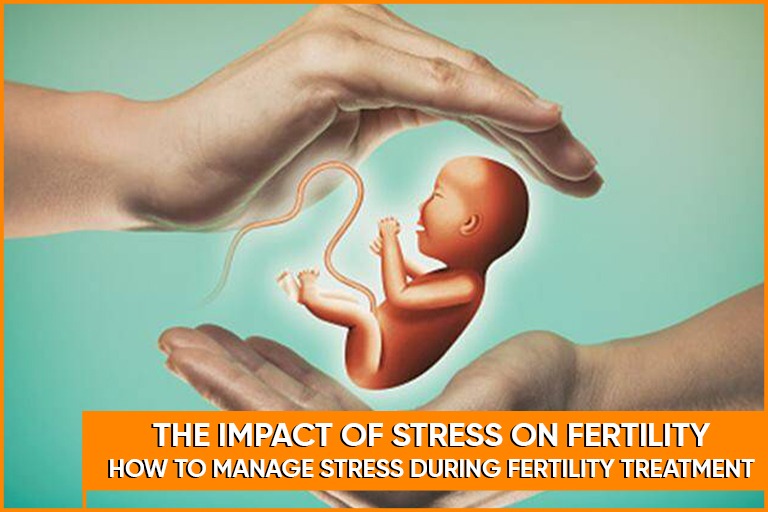
The journey to conception can often be filled with excitement, hope, and at times, significant stress. As many couples navigate this emotional rollercoaster, it’s important to understand the impact of stress on fertility and explore effective techniques for managing it. This blog will delve into the connection between stress and infertility and provide actionable strategies to promote a more relaxed approach to conception.
Understanding the Connection Between Stress and Fertility
Stress is a natural response to life’s challenges, but when it becomes chronic, it can adversely affect both physical and emotional health. Research indicates that stress can influence fertility in several ways:
- Hormonal Imbalance: Chronic stress elevates levels of cortisol, the body’s primary stress hormone. High cortisol levels can disrupt the delicate balance of reproductive hormones, such as estrogen and progesterone, which are critical for ovulation and menstruation.
- Disruption of the Menstrual Cycle: For women, stress can lead to irregular periods or even missed cycles, complicating efforts to conceive. In severe cases, it can contribute to conditions like polycystic ovary syndrome (PCOS), which can further hinder fertility.
- Sperm Quality: In men, stress may affect sperm production and quality. Elevated cortisol levels can lead to decreased testosterone levels, impacting libido and overall reproductive health.
- Emotional Well-being: The emotional strain of trying to conceive can lead to anxiety and depression, creating a cycle of stress that further impacts fertility. Couples may find it difficult to remain optimistic, which can affect their overall approach to conception.
Techniques to Manage Stress for Better Fertility
While it’s impossible to eliminate all stress, there are several effective strategies couples can implement to reduce stress and promote a more positive conception journey:
1. Mindfulness and Meditation
Mindfulness practices, including meditation, have been shown to significantly reduce stress levels. Dedicate a few minutes each day to quiet reflection, focusing on your breath and allowing thoughts to pass without judgment. Mindfulness can help cultivate a sense of calm and acceptance throughout the conception process.
2. Physical Activity
Regular exercise is a powerful stress-reliever. Aim for at least 30 minutes of moderate physical activity most days of the week. Whether it’s walking, swimming, yoga, or dancing, find an activity you enjoy to make it sustainable. Exercise releases endorphins, which can improve mood and reduce stress.
3. Healthy Eating Habits
A well-balanced diet plays a critical role in overall health and can help combat stress. Focus on:
- Whole Foods: Incorporate plenty of fruits, vegetables, whole grains, and lean proteins into your diet.
- Omega-3 Fatty Acids: Foods like salmon, walnuts, and flaxseeds can help reduce inflammation and stress levels.
- Hydration: Drink plenty of water to stay hydrated, as dehydration can contribute to feelings of fatigue and stress.
4. Sleep Hygiene
Adequate sleep is crucial for both physical and mental well-being. Aim for 7-9 hours of quality sleep each night. Create a calming bedtime routine, limit screen time before bed, and maintain a consistent sleep schedule to improve sleep quality.
5. Support Networks
Having a strong support system can help alleviate stress. Consider joining a support group for couples experiencing infertility, or confide in friends and family who can provide encouragement and understanding. Professional counseling or therapy can also be beneficial for managing the emotional aspects of infertility.
6. Relaxation Techniques
Incorporate relaxation techniques into your daily routine, such as:
- Deep Breathing: Practice deep breathing exercises to help calm the mind and body.
- Progressive Muscle Relaxation: This technique involves tensing and relaxing each muscle group, promoting physical relaxation and reducing stress.
- Aromatherapy: Essential oils like lavender and chamomile can create a calming atmosphere. Consider using a diffuser or adding a few drops to a warm bath.
7. Limit Caffeine and Alcohol
Both caffeine and alcohol can increase anxiety levels and disrupt sleep, so consider reducing or eliminating these substances from your routine. Opt for herbal teas or other non-caffeinated beverages, and practice moderation with alcohol consumption.
8. Plan and Organize
Sometimes, the stress of uncertainty can contribute to anxiety. Take control by organizing your schedule, setting realistic goals, and breaking tasks into manageable steps. Creating a plan for medical appointments, treatments, and daily routines can provide a sense of structure and reduce stress.
Final Thoughts
Understanding the connection between stress and fertility empowers couples to take proactive steps toward reducing stress in their lives. By implementing these stress management techniques, couples can create a more supportive environment for conception, improving not only their chances of pregnancy but also their overall well-being. Remember, it’s essential to be kind to yourself during this journey—stress is a normal part of the process, but with the right strategies, it can be managed effectively. If stress becomes overwhelming, consider seeking support from a mental health professional specializing in fertility issues.

